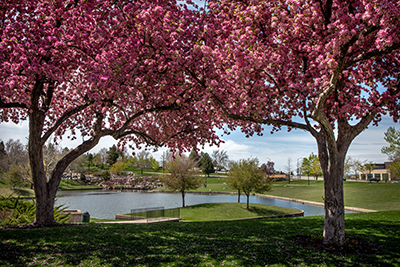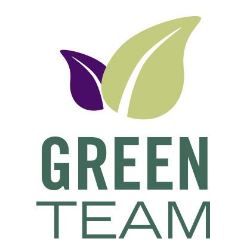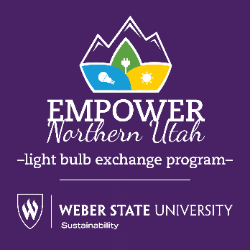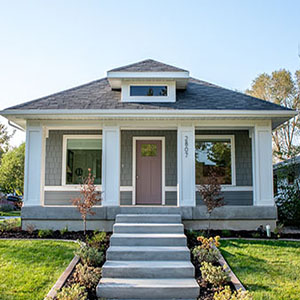Weber State Celebrates Earth Day
OGDEN, Utah – Sustainability remains a top priority at Weber State University, even amidst the challenges presented by a global pandemic. April 22 marks the 51st anniversary of Earth Day, and WSU is celebrating its continued sustainability efforts.
Sustainability Practices and Research Center (SPARC) Director Alice Mulder said the actions of governments, businesses and communities around the world to keep people safe in response to COVID-19 have provided a number of valuable lessons for addressing climate change.
“Importantly, we have learned we can adapt quickly when we are informed by science,” Mulder said. “We can recognize a pressing collective challenge and put our minds to it, with individuals benefiting themselves and the larger community. During the year, we both reduced the spread of the virus and saw reduced emissions and improved air quality as many people worked remotely.”
New and Ongoing Sustainability Efforts:
Carbon Neutral Goal
I n 2007, Weber State set the goal of becoming carbon neutral by 2050. Since then, the university has reduced its electricity consumption by 36%, natural gas consumption by 35% and total greenhouse gas emissions by 34%. In the process, WSU has saved more than $15.9 million in energy costs in the last 10 years, including $2,298,775 on its water and energy costs in fiscal year 2020. This has all been accomplished while adding 566,751 square feet in new and renovated buildings to the WSU campus. The university is set to reach carbon neutrality, 10 years ahead of the original goal.
n 2007, Weber State set the goal of becoming carbon neutral by 2050. Since then, the university has reduced its electricity consumption by 36%, natural gas consumption by 35% and total greenhouse gas emissions by 34%. In the process, WSU has saved more than $15.9 million in energy costs in the last 10 years, including $2,298,775 on its water and energy costs in fiscal year 2020. This has all been accomplished while adding 566,751 square feet in new and renovated buildings to the WSU campus. The university is set to reach carbon neutrality, 10 years ahead of the original goal.
New Ground Source Field
The university has begun construction on its third ground-source field, which is designed to provide all of the heating and cooling energy for the new Noorda Building for Engineering, Applied Science & Technology, as well as provide supplemental energy to campus. The ground-source field runs water through 190 wells dug approximately 350-feet deep, taking advantage of the earth’s constant underground temperature. Weber State uses water to heat and cool buildings; thus, the pre-heated or pre-cooled water reduces energy costs, making it a key part of the university's carbon neutral strategy.
Sustainability Summit Held Virtually
 In March, WSU’s Intermountain Sustainability Summit was held virtually for the second year in a row. The summit welcomed hundreds of sustainability professionals and emerging leaders from Utah and across the nation for two days of events. Keynote sessions were presented by nationally recognized sustainability experts. Jasmine Sanders, director of Our Climate, shared stories of Americans forced to move as a consequence of climate change in her home state of Louisiana. Hazel Henderson, founder of Ethical Markets Media, and Vicki Robin, co-author of “Your Money or Your Life: Transforming Your Relationship With Money and Achieving Financial Independence,” discussed green economics.
In March, WSU’s Intermountain Sustainability Summit was held virtually for the second year in a row. The summit welcomed hundreds of sustainability professionals and emerging leaders from Utah and across the nation for two days of events. Keynote sessions were presented by nationally recognized sustainability experts. Jasmine Sanders, director of Our Climate, shared stories of Americans forced to move as a consequence of climate change in her home state of Louisiana. Hazel Henderson, founder of Ethical Markets Media, and Vicki Robin, co-author of “Your Money or Your Life: Transforming Your Relationship With Money and Achieving Financial Independence,” discussed green economics.
Solve Climate by 2030
As part of a national event called Solve Climate, Weber State hosted the Utah Solve Climate by 2030 webinar on April 7. The live event attracted over 130 attendees who tuned in to hear from the four panelists: John Curtis, Utah Rep. for the 3rd District; Vicki Bennett, Salt Lake City Sustainability director; Thomas Holst, Senior Energy Policy Analyst of the Kem C. Gardner Policy Institute; and Olivia Juarez, Latinx community organizer with the Southern Utah Wilderness Alliance.
More than 250 people, including teachers and students from Utah schools, registered to watch either the live webinar or the recording.
 Campus-Wide Green Department Certification Program
Campus-Wide Green Department Certification Program
WSU’s Green Department Certification Program engages more than 80 campus offices and departments in various efforts to make the university more sustainable. Participants in the voluntary program assemble a “Green Team” and earn points by selecting from a wide range of sustainable strategies such as reducing energy consumption, reducing waste and transitioning office purchases to environmentally friendly products. Points achieved determine certification at the bronze, silver, gold or green levels.
Classrooms
For the second year, faculty have applied to have a sustainability attribute or “SUS” added to their course, indicating a focus or inclusion of sustainability content in some way. Over 50 classes have the SUS attribute, representing disciplines from all colleges. The connection to sustainability across disciplines is evident in classes including, anthropology, economics, physics, nursing, interior design, English, math and chemistry.
Empower Northern Utah Program
 Last fall Weber State’s Empower Northern Utah program helped over 340 northern Utah households increase the energy efficiency of their homes. The program provided 264 discounted and no-cost smart thermostats and over 1,500 high-efficiency LED light bulbs at no cost. The program was designed to empower residents to lower their carbon emissions and utility bills through easy efficiency upgrades.
Last fall Weber State’s Empower Northern Utah program helped over 340 northern Utah households increase the energy efficiency of their homes. The program provided 264 discounted and no-cost smart thermostats and over 1,500 high-efficiency LED light bulbs at no cost. The program was designed to empower residents to lower their carbon emissions and utility bills through easy efficiency upgrades.
Completed Sustainability Projects:
W10 Parking Goes Solar
In the fall of 2020, Weber State completed its first solar-covered-parking array over the W10 lot on the northwest corner of the Ogden campus. The array houses 550 kilowatts of solar panels that feed into Lindquist Hall and the campus electrical grid. The power produced by the array is expected to offset 80% of Lindquist Hall’s energy consumption.
Net Zero House
In the summer of 2020, WSU completed its first collaborative community project to build a highly efficient, all-electric, renewably  powered home in Ogden’s east central neighborhood. An interdisciplinary team of WSU students helped design and build the 2,540-square-foot home. The home also included battery backup for emergencies and produced enough solar power to charge an electric vehicle to travel 20 miles per day. The project won the Energy Performance category of the international Solar Decathlon Build Challenge hosted by the Department of Energy.
powered home in Ogden’s east central neighborhood. An interdisciplinary team of WSU students helped design and build the 2,540-square-foot home. The home also included battery backup for emergencies and produced enough solar power to charge an electric vehicle to travel 20 miles per day. The project won the Energy Performance category of the international Solar Decathlon Build Challenge hosted by the Department of Energy.
Renewable Energy in Action
Additional completed renewable energy projects at Weber State include two ground source fields that help heat and cool campus and a seven-acre solar field that supplies the energy needs to the WSU Davis campus in Layton. These projects are a vital part of helping the university reach its carbon neutral goal.
In reflecting on the year, Mulder noted, “At Weber State we’ve made a serious commitment to work toward sustainability and address climate change. When the university first committed to carbon neutrality by 2050, we didn’t know how we would do it. However, once we put our minds to it, we found practical and economically beneficial pathways to success. We have spent this year updating our Climate Action Plan, including moving forward our goal to 2040, and are working to help other organizations make and reach their own sustainability goals.”
Visit weber.edu/wsutoday for more news about Weber State University.
Shaylee Stevens, Office of Marketing & Communications
801-626-7948 • shayleestevens@weber.edu- Contact:
Allison Barlow Hess, Public Relations director
801-626-7948 • ahess@weber.edu